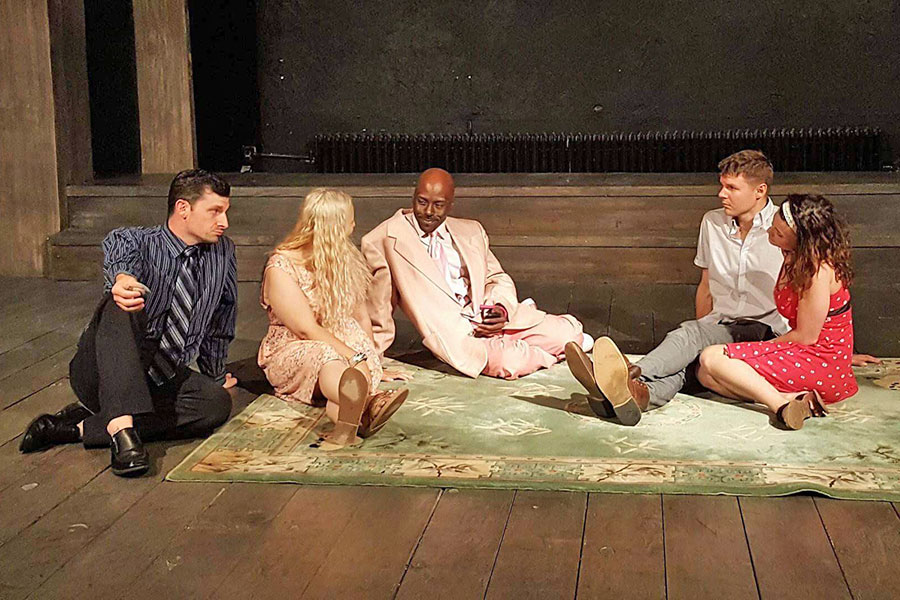There’s something cozy about the “curated” part of the upcoming Fringe Festival, with its rich dedication to the concept of home and its direct auxiliary conceits of proximity, family, comfort and closeness. That’s what you’ll see in Geoff Sobelle’s athletic “HOME,” Thaddeus Phillips and Steven Dufala’s kid-friendly “Billion Nights on Earth,” Pig Iron Theatre’s existentialist “Period of Animate Existence” and Michael Kiley’s spirited “Close Music for Bodies.”
Yet, when it comes to the Neighborhood Fringe — the artists’ independent wing of the Fringe — subjects switch and veer a bit in that LGBT show runners and subject matter move toward a mix of big glam to the “great again” goofiness of Donald Trump’s rhetoric.
The original bisexual rock god David Bowie and his spirit guide’s influence on an artist’s sensibility is the musical topic of Mary Monahan and Ego Actus’ “Moonage Daydream” (named from the “Ziggy Stardust and the Spiders from Mars” hit) at the Philadelphia Art Alliance. Moving from bisexuality to poly-sexuality (and with glam in its very name) Polyglamorous Productions and SEXx Interactive team up to present “A List of Common Misconceptions,” a catalogue of sexual errors and wonders lampooned as a Schoolhouse Rocks-ish after-school special, done up in drag and burlesque — and at Adobe Café on East Passyunk Avenue yet.
For the sake of good old androgyny, there’s Greenfield Collective’s “Tilda Swinton Adopt Me Please” at Asian Arts Initiative. Directed by Maura Krause, this twisted Tilda tale looks at art and gender identification through the lens of the show’s hero. For the sake of drag-kitch or Ryan Murphy-based camp, there’s JCProductions’ “Joan Crawford in Her Own Words” with Eric Singel as the drunk and divine Joan. Now at Tabu Lounge, this one-woman show actually debuted at the old 2-4-7 in 1993.
Where the current scorched-earth (and flooded-out) political landscape is concerned, “Great Again and The Passion of Kellyanne” is for you. With Cary Curran as the beleaguered Conway, written and directed by Andi Stover and with a cast of female performers (Madeleine Mfuru and Leanne Velednitsky), the LiveFeedNYC company and Mascher Space Co-Op tell a tale of two Kellyannes — the liar and the patriot.
One man who seems to want to tackle the glittering gilded age (the Roaring ’20s) and the Apocalyptic Trump-ian Now is multi-hyphenate Harrison Stengle and his “GATZ,” which takes place at the Philadelphia Shakespeare Theatre. A Fringe Fest veteran from 2015’s “Cult Classic” and last year’s “Sword of the Unicorn” (the latter of which tackles false narratives about the coming-out experience), Stengle approaches Fitzgerald-ian decadence with his tongue in his cheek, his weirdness set to “stun” and his fist in the air. I spoke with Stengle in the middle of rehearsals for “GATZ.”
PGN: Whether you’re painting portraits of melancholy or cheer, exploded reality or fiction, is it fair to say that you always use a surrealistic method to go with the madness?
HS: The idea of my work is to switch the literary placement of realism with surrealism and symbolism. The idea is that audiences should be aware of the symbolic value first, then understand the realistic qualities underneath. The idea of this post-modernist parody is not to pull away from the original work but to give it a new dimension.
PGN: You identify as LGBT, yes? How does that play into your work?
HS: I identify as gender-nonconforming, but I do not believe in labels. I have a romantic interest in men, but as far as sex with men, I am asexual. Love and attraction can be superstar things. My LGBTQ show, “Sword of the Unicorn,” states, “I’m gray. That’s who I am; that is what everyone is on some level.” I personally think being true to your identity is awesome. Nick Carraway is portrayed in “GATZ” as a closeted homosexual, constantly belittled and being forced into a relationship he doesn’t want to be a part of. It is tragic whenever someone feels restricted. Also there’re hints of him being in love with Gatsby.
PGN: Why this story for 2017?
HS: It started as a joke with my mother and became the play it is now. The apocalyptic theme reflects so well the feelings of those who lived through the Great War. Entire communities were wiped out. The newer generation has trouble relating to things that, to them, seem as though they are in the long-distant past. The symbolic overhaul of this piece will put the themes into a more-relatable prospective. It will also cross the gap of isolation for more experienced audience members. Audiences of all ages can enjoy this show. When I discovered the racial themes of “The Great Gatsby,” I knew I had to do this show. It became a social-justice project. It wasn’t my original intention to have Gatsby played by a black man, but now I can’t see doing it any other way.
Visit www.fringearts.com for times and ticket prices.

